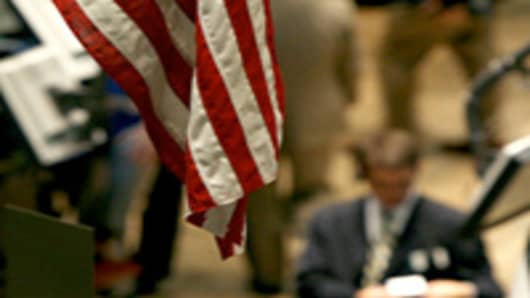Now that Europe's one-day summit is out of the way, the market focus may shift back to the U.S. economy and what is bothering stocks.
Dell's earnings may be one of those things Wednesday morning. Its after-the-bell earnings report Tuesday beat estimates on the bottom line, but missed on the top line. Dell shares fell nearly 8 percent, as it also forecast flat revenues in the third quarter and lowered full-year revenue growth to 1 to 5 percent, from 5 to 9 percent.
Whether Dell is a forewarning for Hewlett-Packard , which reports earnings Thursday, has yet to be seen, but it may spill into other tech names. Skull Candy, a recent IPO, was also down sharply in after hours trading on disappointing earnings.
There are a number of companies reporting Wednesday morning including Deere , Target , Abercrombie and Fitch , Staples and Chico's FAS . After-the-bell reports are expected from JDS Uniphase , Limited Brands and PetSmart.
The major U.S. economic report Wednesday is PPI inflation data, at 8:30 a.m. Mortgage applications data is reported at 7:30 a.m. Dallas Fed President Richard Fisher speaks on Federal Reserve functions and monetary policy at 1:20 p.m. ET at a forum, hosted by the Dallas Fed.
Euro Drama
Stocks Tuesday finished lower but were well off the lows of the day, which were reached shortly after German Chancellor Angela Merkel and French President Nicolas Sarkozy announced their latest plan to fix the euro zone debt crisis. The two leaders announced a proposed framework that they hoped would bring the 17 nations of the euro zone closer together fiscally. Their plan would require each country to have a balanced budget and a more cohesive tax structure.
They also said they would seek a tax on financial transactions, which sent the shares of banks and exchanges, like NYSE Euronext, lower. NYSE was down more than 8 percent.
"I don't think it (the plan) solves anyone's problems," said Brown Brothers Harriman chief currency strategist Marc Chandler. The markets were looking for signs that the EFSF, European Financial Stability Facility could be expanded so that it's big enough to handle larger bond purchases if needed to stabilize markets. But the two leaders said they were satisfied with the size of the EFSF, which is about 440 billion euros.
Merkel also said a euro zone-wide bond would not be issued, another disappointment for the markets. Germany has opposed such a bond, but it has been pushed for by other countries that see it as a quick way to heal their debt problems.
The euro zigzagged on the news. "The first instinct is to sell off, and then its direction manifests itself," said Boris Schlossberg of GFT Forex. "I think fundamentally this was a substantive, relatively positive euro message, given the circumstances they were operating under." The euro was off 0.3 percent against the dollar at 1.4408 at the end of the New York day but was weakening into the evening hours.
Schlossberg expects other countries to agree to the plan. "The euro has become so much a deep part of the Eurpeoan economic fabric that's it's difficult to see it fracture at this point. They'll make every effort to support it," he said.
The Swiss franc has weakened in recent sessions on speculation the Swiss National Bank will take more measures to curb its gains, including the idea of a possible temporary peg to the euro. "The Swiss have a cabinet meeting Wednesday and if they make a decision it will probably be then," said BNP Paribas currency strategist Mary Nicola.
Whither Stocks
The Dow slumped 76 points Tuesday to 11,405, and the S&P 500 fell 11 to 1192.
"If you have any faith at all that we're not going to fall into a recession, the the market is deeply undervalued here," said Cantor Fitzgerald market strategist and technical analyst Marc Pado. "I realize the risk out there is the contagion from Europe to the U.S. from the debt crisis. For that reason, the market is trading at a discount. There's some justifiable reasons, but for the S&P to get to those levels (last week) was extreme."
Pado pointed to Tuesday's better-than-expected 0.9 percent increase in industrial output in July. It was the best gain in seven months as activity in the auto sector rebounded from the depressed levels hit in April after the Japanese earth quake disrupted the industry supply chain. He also notes that jobless claims of less than 400,000 last week was a good sign, if the trend continues.
Questions? Comments? Email us at marketinsider@cnbc.com



